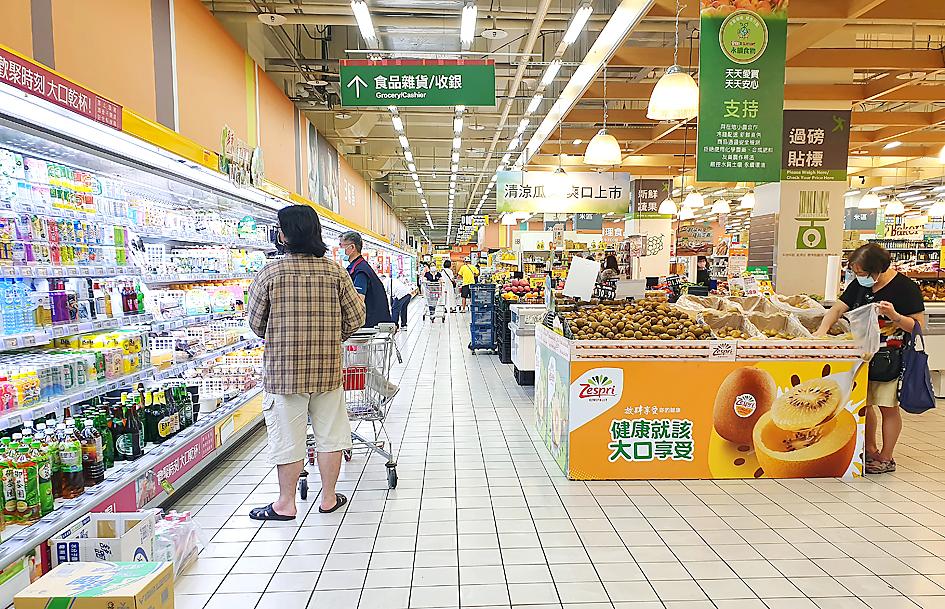Hypermarket chains generated NT$161.1 billion (US$5.75 billion) in sales in the first eight months of the year, up 3.6 percent year-on-year, as purchases of food and daily necessities increased amid a local COVID-19 outbreak, even though sales derived from their food courts dropped due to a nationwide ban on dine-in services, the Ministry of Economic Affairs said in a report on Friday.
Additionally, as hypermarket chains accelerated development of their online shopping platforms this year, riding the post-pandemic trend of offline consumption transitioning to online, they saw Internet sales increase by 49.2 percent year-on-year during the eight-month period.
This was higher than the 0.2 percent growth in physical store sales over the same period, the ministry said.

Photo: Chen Chih-chu, Taipei Times
“The proportion of online sales increased from 3.7 percent last year to 5.1 percent this year, which became another driving force for hypermarket chains’ revenue growth,” it said.
Major hypermarket players in Taiwan include Carrefour Taiwan (家樂福), Far Eastern A-Mart Co (遠東愛買) and RT-Mart International Ltd (大潤發). These brands provide a diverse range of products to meet consumers’ demand for bargains and one-stop shopping, leading sales to continued growth in the past few years.
Last year, due to panic buying amid the escalating COVID-19 situation and the contribution of the government’s Triple Stimulus Voucher program, along with the effects of rising online shopping and store expansion, hypermarket chains reported sales growth by the largest annual pace since 2011, up 8.9 percent to NT$228.7 billion, the ministry said.
Sales data showed that food products led by 42.4 percent last year, followed by household appliances with 20.3 percent, while beverages, tobacco and alcohol items accounted for 11.3 percent to rank third, the ministry said.
The peak sales periods were in January to February and July to August, as customers purchased goods ahead of the Lunar New Year holiday in winter, and the Ghost Festival and Mid-Autumn Festival in summer, it said.
Facing challenges such as price competition, low gross profit and rising labor costs, hypermarket chain operators expect that their e-commerce models and improved marketing strategies should bring consumers closer to their stores, boosting customer loyalty, frequency of purchases and revenue growth, the ministry said.
Hypermarket chains are also entering the supermarket business as they aim to expand business scale and reduce procurement costs, while boosting resource integration and distribution efficiency, the ministry said.
Carrefour last year acquired supermarket chain Wellcome Taiwan Co (惠康百貨) for US$112.5 million, a move that gave it ownership of all Wellcome supermarkets and Jasons Market Place outlets in Taiwan.
“With the changes in family structure and consumer behavior, coupled with fierce competition in the industry, hypermarket chains have gradually penetrated into local communities and focused on supermarket stores, in addition to large shopping malls,” the ministry said. “This strategy will help them grow revenue and rapidly increase market share.”
As of the end of August, hypermarket chains operated 373 stores in Taiwan, an increase of 186 from the end of last year. Among them, 183 were supermarkets gained through mergers and acquisitions, the ministry’s tally showed.

The Eurovision Song Contest has seen a surge in punter interest at the bookmakers, becoming a major betting event, experts said ahead of last night’s giant glamfest in Basel. “Eurovision has quietly become one of the biggest betting events of the year,” said Tomi Huttunen, senior manager of the Online Computer Finland (OCS) betting and casino platform. Betting sites have long been used to gauge which way voters might be leaning ahead of the world’s biggest televised live music event. However, bookmakers highlight a huge increase in engagement in recent years — and this year in particular. “We’ve already passed 2023’s total activity and

Nvidia Corp CEO Jensen Huang (黃仁勳) today announced that his company has selected "Beitou Shilin" in Taipei for its new Taiwan office, called Nvidia Constellation, putting an end to months of speculation. Industry sources have said that the tech giant has been eyeing the Beitou Shilin Science Park as the site of its new overseas headquarters, and speculated that the new headquarters would be built on two plots of land designated as "T17" and "T18," which span 3.89 hectares in the park. "I think it's time for us to reveal one of the largest products we've ever built," Huang said near the

China yesterday announced anti-dumping duties as high as 74.9 percent on imports of polyoxymethylene (POM) copolymers, a type of engineering plastic, from Taiwan, the US, the EU and Japan. The Chinese Ministry of Commerce’s findings conclude a probe launched in May last year, shortly after the US sharply increased tariffs on Chinese electric vehicles, computer chips and other imports. POM copolymers can partially replace metals such as copper and zinc, and have various applications, including in auto parts, electronics and medical equipment, the Chinese ministry has said. In January, it said initial investigations had determined that dumping was taking place, and implemented preliminary

Intel Corp yesterday reinforced its determination to strengthen its partnerships with Taiwan’s ecosystem partners including original-electronic-manufacturing (OEM) companies such as Hon Hai Precision Industry Co (鴻海精密) and chipmaker United Microelectronics Corp (UMC, 聯電). “Tonight marks a new beginning. We renew our new partnership with Taiwan ecosystem,” Intel new chief executive officer Tan Lip-bu (陳立武) said at a dinner with representatives from the company’s local partners, celebrating the 40th anniversary of the US chip giant’s presence in Taiwan. Tan took the reins at Intel six weeks ago aiming to reform the chipmaker and revive its past glory. This is the first time Tan